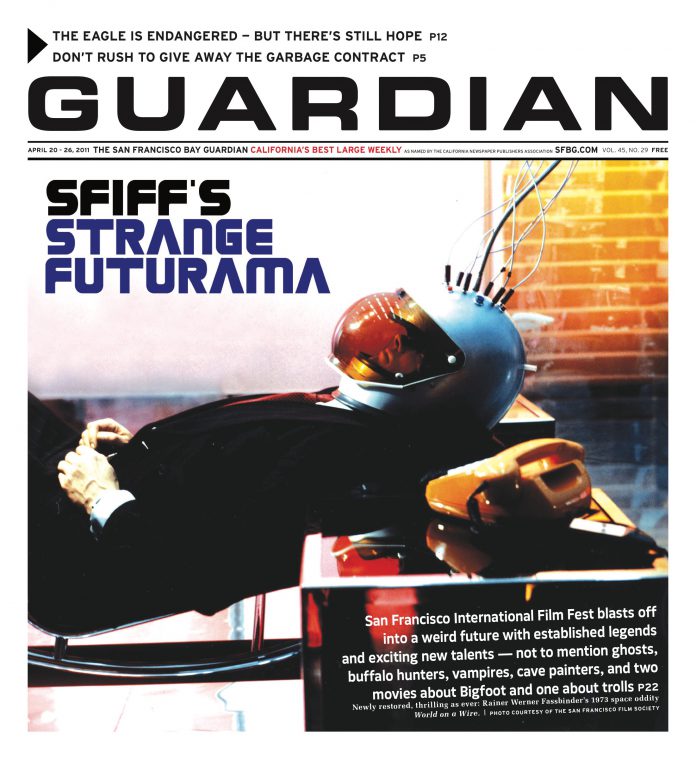arts@sfbg.com
SAN FRANCISCO INTERNATIONAL FILM FESTIVAL Science fiction’s open secret is that it has never really been about the future. As William Gibson explained to an interviewer in 2007, echoing earlier genre criticism by writers such as Samuel R. Delany and Joanna Russ, science fiction is, at its heart, “speculative fiction, but you don’t really have the future to work with, so you are always working with history and with the present.”
Gibson’s ecumenical gloss on genre fiction provides a helpful rubric under which to view some of SFIFF’s odder ducks. Although each of the following films slot differently genre-wise — apocalyptic road movie, surrealist fantasy, cybernetic thriller — the “what ifs?” posed by their imaginings of alternate presents (and in one case, an alternate past) certainly qualify them as speculative fictions. To what degree their directors are skilled at telling such stories remains open to speculation.
It’s hard to tell which way the world ends (or if it is ending at all) in Jo Sung-Hee’s dark, head-scratcher of a debut feature, End of Animal. The modest production opens inside a taxi, which a young pregnant woman is taking to her mother’s place in the country. All hell breaks loose when the driver, for reasons left unexplained, picks up a male hitchhiker who within minutes is spouting end times gibberish and, following his prediction of the blinding freak flash that suddenly cuts off all power in the surrounding area, vanishes into thin air.
Much like K in Franz Kafka’s The Castle, the now-stranded and cell phone-less woman spends the next hour and a half unsuccessfully trying find a roadside shelter, alternately befriending and fending off increasingly-hostile locals who are just as confused and frightened as she is. Are we watching those left behind duke it out post-Rapture? Or was the hitchhiker an alien? And why does he want the woman’s baby so badly? Unfortunately, End of Animal drops many tantalizing breadcrumbs but offers no trail to follow.
Unlike other contemporary ruminations on the apocalypse, such as Michael Haneke’s Time of the Wolf (2003) or Kiyoshi Kurosawa’s Charisma (1999) and Pulse (2001), End of Animal‘s explanatory obstinacy does not enhance the drama or emotional intensity of watching its protagonists endure their trials by fire, but rather, leaves viewers feeling just as lost in the woods.
Alejandro Chomsky offers something more transparent in his serviceable adaptation of fellow countryman and frequent Borges collaborator Adolfo Bioy Casares’ 1973 novel Asleep in the Sun. Chomsky translates Casare’s strange tale of a humble watchmaker who uncovers a sinister plot in which the souls of the mentally afflicted are siphoned into unknowing canines with plenty of visual relish, thanks to an antiseptic color palette and great 1930s-inspired production design. The film mixes bemusement and dead earnestness to its detriment, dialing down the urgency of its protagonist’s growing realization that he is the lapdog of an all-controlling bureaucracy from “nightmarish” to merely “unpleasant.” Alas, Asleep in the Sun‘s Kafka-esque (there he is again) pretensions are all bark and no bite.
Well, thank your SFIFF programmers for including the recently restored version of Rainer Werner Fassbinder’s 1973 techno-caper World on a Wire. Originally made as a two-part miniseries for German TV, Fassbinder’s only foray into science fiction finds the uber-prolific director borrowing a page or two from Alphaville (1965) while blowing some air kisses to Stanley Kubrick’s monolith 2001: A Space Odyssey (1968) and out Matrix-ing 1999’s The Matrix by some 25 years.
When the inventor of a supercomputer responsible for generating an artificial world mysteriously disappears, his handsome predecessor must fight against his corporate bosses to find out what happened, in the process stumbling on a far more shattering secret about the nature of reality itself. Sound crazy? Well, it is. But, between the mirrored and Lucite furniture, chiseled Teutonic women in disco finery, chase sequences, and frenetic zooms, it adds up to some of the most enjoyable hours you can spend at the festival.
SAN FRANCISCO INTERNATIONAL FILM FESTIVAL
April 21–May 5, most shows $13
Various Bay Area venues

